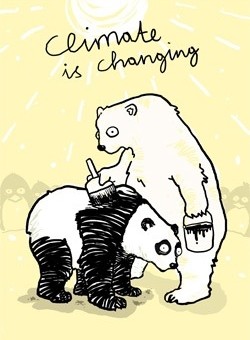 Deep-gray on California’s north coast this early Monday, and damp with patchy-drizzly fog — if trends continue, however, by mid-morning we should be awash with sunshine.
Deep-gray on California’s north coast this early Monday, and damp with patchy-drizzly fog — if trends continue, however, by mid-morning we should be awash with sunshine.
Environmental concerns across the pond — amidst Britain’s Brexit chaos is the danger for climate research (National Geographic): ‘“It’s depressing, but the uncertainty doesn’t help,” says Philip Jones, research director of the University of East Anglia’s Climatic Research Unit in Norwich, England. “I just hope that science doesn’t get forgotten in all of this.”‘
Nigel Farage, a yuuge mouth to Leave the EU, has ‘dismissed climate change as a scam‘ — sound frightfully familiar?
Another brick in the wall for our changing climate…
(Illustration by Handoko Tjung, found here).
Farage, the UK’s version of America’s “shit stain,” has already backtracked on a pledge that £350 million from the EU will go straight to the National Health Service (the Independent):
“No I can’t [guarantee it], and I would never have made that claim. That was one of the mistakes that I think the Leave campaign made,” he said.
When it was pointed out that Vote Leave emblazoned the £350 million claim onto the side of a tour bus and drove it around the country, Mr Farage said: “It wasn’t one of my adverts – I can assure you! I think they made a mistake in doing that.
“We have a £10 billion, £34 million a day featherbed, that is going to be free money that we can spend on the NHS, on schools, on whatever it is.”
Again, sound shitty familiar? Misdirect the blame to underlings…
Along with climate, UK’s research universities receives more than a billion pounds (1.37 billion dollars) per year from the EU, including more than 40 percent of Britain’s cancer research funds — some 126 million pounds (173 million dollars) over the last decade.
The Brits fucked themselves, and maybe the world.
And the highly-charged Paris climate accord could be in danger — Chris Mooney at the Washington Post on Friday:
Closely related but similarly unclear is how the E.U. and Britain will now join the Paris climate agreement, which does not come into force until 55 countries, representing 55 percent of global emissions, fully join.
For the E.U., that was always going to be a complex process, with each member state having to individually go through its own process before the E.U. as a whole can join.
It’s not immediately clear how Brexit influences or changes this.
Christiana Figueres, the outgoing executive secretary of the U.N. Framework Convention on Climate Change, was quoted recently about Brexit as follows: “From the point of view of the Paris agreement, the U.K. is part of the EU and has put in its effort as part of the EU, so anything that would change that would require then a recalibration.”
But it is not clear exactly what this “recalibration” entails.
And the changing-for-the-worse climate isn’t slowing — also last Thursday (same day as UK’s Brexit vote) came this crap discovery on what’s sometimes called pink snow, or watermelon snow, and the rapid melting of Arctic ice.
From HuffPost:
The appearance of the so-called pink snow, which Arctic explorers have observed for centuries, is the result of a red algae that likes to bloom in the frozen water.
In a study published Wednesday in the journal Nature Communications, researchers found that those algal blooms are causing the ice to melt faster, and the algae is likely to grow more rapidly as climate change melts even more of the Arctic into the liquid water that feeds them.
The presence of red algae, the study found, lowers the snow’s albedo, or its ability to reflect light instead of absorbing it as heat (similarly to how a white T-shirt keeps you cooler in the sun than a black or colorful one does).
Over a 100-day period during the melting season, the study found that snow affected by the red algae had a 13 percent lower albedo than white snow.
This is not an instance of the unprecedented melt in the Arctic occurring naturally and without manmade global warming.
On the contrary, the study authors say, it’s an example of how human-caused climate change functions on a positive feedback loop with other things in nature.
As explained via Nature World News:
Commonly found in polar and alpine settings like Greenland, Antarctica, the Alps and Iceland, the red algae blooms when they experience a rise in temperature in their surroundings.
They accelerate the melting rate by reducing the glaciers’ albedo effect by as much as 13 percent.
The albedo effect is a process of glaciers to keep the earth cool by reflecting sunlight.
However, as these red algae populate the surface, the glacier surfaces’ ability to reflect sunlight decreases.
Added climate grief news — from Scientific American also on Thursday:
As many as 3,331 people annually could die from heat waves by 2080 in New York City alone if no steps are taken to adapt to warming temperatures and reduce emissions, a new study warns.
The report comes at the same time as a separate analysis tracing climate change and air pollution’s effects on children.
Together the studies, both out of Columbia University, lay out the case for cutting carbon now.
“We now know a great deal about the harm from the emissions from fossil fuels,” said Frederica Perera, director of the Columbia Center for Children’s Environmental Health at the Mailman School of Public Health.
“We know a great deal about how to reduce our dependence on fossil fuels.”
And people like me: ‘“Aging of the population is probably the most important trend, since older adults are more vulnerable to heat-related health effects,” said co-author Patrick Kinney, a professor of environmental health sciences at Columbia University, in an email.’
We hope reality trumps dangerous bullshit…